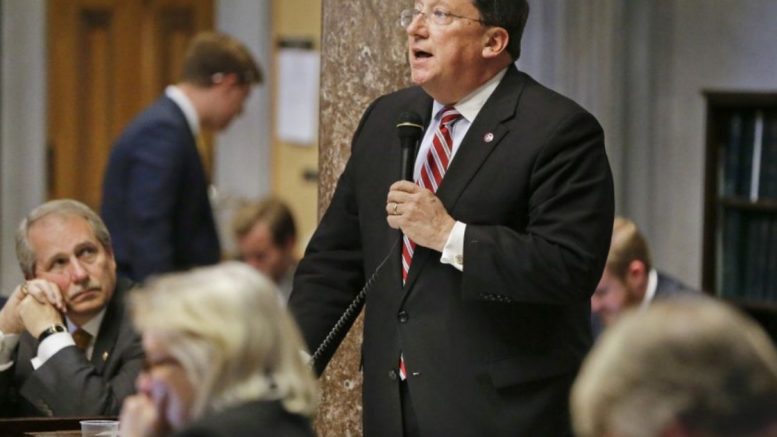“My response is full speed ahead,” said Norris, who earlier this year sponsored a resolution adopted by the Legislature that called on Attorney General Herbert Slatery to file a lawsuit against refugee resettlement in the state after President Obama announced plans to allow 10,000 Syrian war refugees into the county.
Slatery declined to do so, saying such an effort would be “based upon untested, novel theories” of law. The Thomas Moore Law Firm, which regularly advocates in courts for conservative causes, has been named to act on Tennessee’s behalf in pursuing the lawsuit at no cost to the state.
Norris and other Republican legislators pushing the lawsuit say the federal government has failed to properly consult with Tennessee on placing refugees within the state and has left the state paying some costs associated with the refugees without legislators specifically allocating funds for the purpose.
Gov. Bill Haslam has differed with Norris on refugees. After initially voicing concerns earlier this year, the governor said in September that, after conferring with those involved in the process, he now thinks that federal officials “have all the right controls and procedures in place.” That includes appropriate background checks and vetting of individual refugees, he said.
Gov. Haslam discusses vetting refugees coming to Tennessee on Thursday, Sept. 15, 2016. Amy Smotherman Burgess/News Sentinel
Norris said pursuing the lawsuit will serve as means of defining the state rights as well as the “rights of legitimate refugees.”
Medicaid expansion: Members of a task force looking at ways to expand Medicaid coverage in Tennessee have agreed to continue their work while awaiting decisions by the Trump administration and Congress that could make major alterations in federal funding for health care.
The Three Star Healthy Task Force, created by House Speaker Beth Harwell with the goal of finding a replacement for Gov. Bill Haslam’s Insure Tennessee proposal that was rejected by the Legislature last year, met Thursday with Tony Spezia, former CEO of Knoxville-based Covenant Health, sitting as a new member.
The panel’s chairman, Rep. Cameron Sexton, R-Crossville, said Spezia volunteered his services and he expects to add other members in the near future. The panel lost one of its legislator members when Rep. Steve McManus, R-Cordova, was defeated in the Nov. 8 election.
Trump, during his campaign, expressed support for changing current Medicaid rules to instead provide states with block grants of federal money with fewer restrictions on how it can be spent. Many other Republicans, including Tennessee legislators and Haslam, have voiced support for the concept, though it may be many months before a decision is made by Congress and the new federal administration, leaving any details uncertain.
Spezia said he believes there is a “very high” probability of a block grant system being enacted, according to The Tennessean, and several other members of the task force voiced similar sentiments. It is speculated that block grants could be used to expand coverage in new areas. The task force already has recommended allowing low-income veterans and persons suffering from some behavioral disorders to become eligible for Medicare coverage through the state’s TennCare system.
Sexton said that, by continuing its studies and working with members of the Tennessee congressional delegation, the task force will be able to act quickly in proposing a plan once federal revisions become clear.
McNally suggests pension changes: Sen. Randy McNally, chosen last week by Senate Republicans to become lieutenant governor and speaker of the Senate, says he believes changes should be made in current state law on revoking a legislator’s state pension upon conviction of a felony.
Sen. Randy McNally, second from left, recites the Pledge of Allegiance before a Senate Republican caucus meeting in Nashville, Tenn., on Thursday, Nov. 17, 2016. The Oak Ridge Republican was later nominated as the next speaker of the upper chamber of the General Assembly, where the GOP holds a 28-5 majority over Democrats. (AP Photo/Erik Schelzig) (Photo: Erik Schelzig, AP)
His comments in an interview came after Tennessee Consolidated Retirement System officials said last week that former Rep. Joe Armstrong, D-Knoxville, has been deemed eligible to receive his $28,744 per year state pension despite his conviction on a federal felony charge of filing a false income tax return.
Shortly after Armstrong’s August conviction, McNally said he felt Armstrong’s pension application should be rejected under current state law, which says a lawmaker forfeits pension benefits if “convicted in any state or federal court of a felony arising out of that person’s official capacity, constituting malfeasance in office.”
But McNally said Thursday that he was not familiar with all details of Armstrong’s conviction at the time and respects the decision of TCRS officials and state Treasurer David Lillard, who oversees the retirement system.
“They have the expertise,” he said, noting that rejection of the pension likely would have led to a lawsuit by Armstrong with the certainty of increased costs to the state and a possibility of losing so the pension would be paid anyway.
State Rep. Joe Armstrong, center, with his wife, LeTonia, and attorney Gregory Isaacs, leaves court after being found guilty of one felony count in his tax fraud trial Monday, Aug. 8, 2016, at the Howard H. Baker Jr. U.S. Courthouse. The jury acquitted Armstrong of two other counts. He was charged with conspiring with accountant Charles Stivers to hide the profit from a cigarette tax stamp hike that Armstrong helped pass. (PAUL EFIRD/NEWS SENTINEL) (Photo: Paul Efird)
Armstrong’s conviction involved failing to pay taxes on profits he made by buying state cigarette tax stamps, through a tobacco wholesaler, and then selling them at a much higher price after a 2007 cigarette tax hike that he supported in the General Assembly. TCRS officials decided that did not amount “malfeasance in office.”
Before 2006, legislators convicted of felonies involving their duties in office – as five were in the 2005 “Tennessee Waltz” bribery scandal – were nonetheless eligible for state pensions. The law was changed in that year – with McNally as a leading advocate – to put the present statute in place, though it did not apply to lawmakers convicted in the FBI sting operation.
“That’s probably something we need to look at further,” the veteran legislator said.
McNally said one option would be to make commission of any “Class A or Class B” felony – offenses with the highest penalty, including murder, attempted murder, child abuse and rape – grounds for revocation of pensions. But some lower-level offenses that do not involve official duties probably should not be covered, he said.
As a hypothetical example, McNally said federal law makes it a felony to destroy a mailbox. He envisioned an “elderly person who probably should not be driving in the first place” winding up with a felony conviction and losing the pension that a family depends on for much of its financial support.
McNally as governor?: In response to reporter questions, McNally also dismissed speculation on the possibility that he could wind up as governor rather than lieutenant governor if U.S. Sen. Bob Corker is appointed to President-elect Trump’s cabinet.
Haslam would appoint a successor to Corker in such a situation and, if he appointed himself, then the lieutenant governor would become governor. McNally noted, first of all, that Haslam has indicated he would not appoint himself to the vacancy should it occur and instead would be inclined to appoint a “caretaker” who would not seek election to a full term in 2018. And Corker has downplayed the possibility of an appointment, though conceding he is “in the mix” for discussion purposes.
Even if such a scenario developed, McNally said, it would “probably be Gov. Ron Ramsey,” not Gov. McNally.
McNally officially will become Senate speaker and lieutenant governor on the opening day of the 2017 legislative session, Jan. 10, when a formal vote is taken on the Senate floor. Until then, Ramsey continues to hold the position of Senate speaker and lieutenant governor.
Trump’s inauguration is Jan. 20, and McNally said the president-elect surely will complete his cabinet appointments weeks before then – meaning the vacancy likely would occur while Ramsey still was in office.
Ramsey’s post-office ambitions: Ramsey, meanwhile, was asked Thursday whether he had received any offers to become a lobbyist after he leaves office and, if so, whether he would considering accepting one or more.
“Yes and yes,” he said. “We’ll see.”
The Blountville auctioneer declined to elaborate.
520 CONNECT TWEET LINKEDIN COMMENT EMAIL MORE
Read or Share this story: http://knoxne.ws/2gcfizS
Source: www.knoxnews.com




